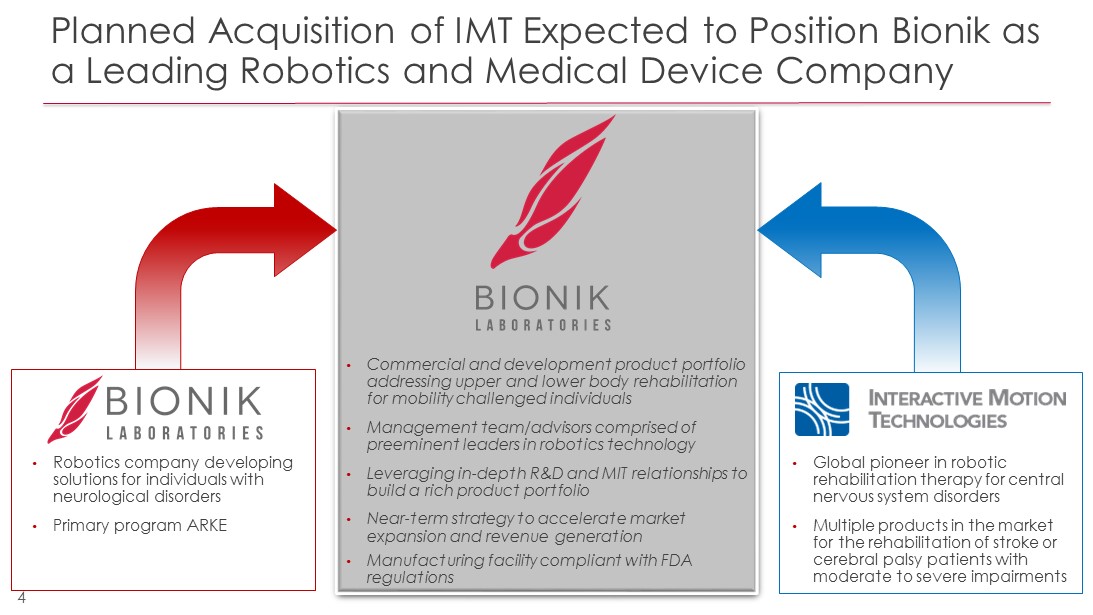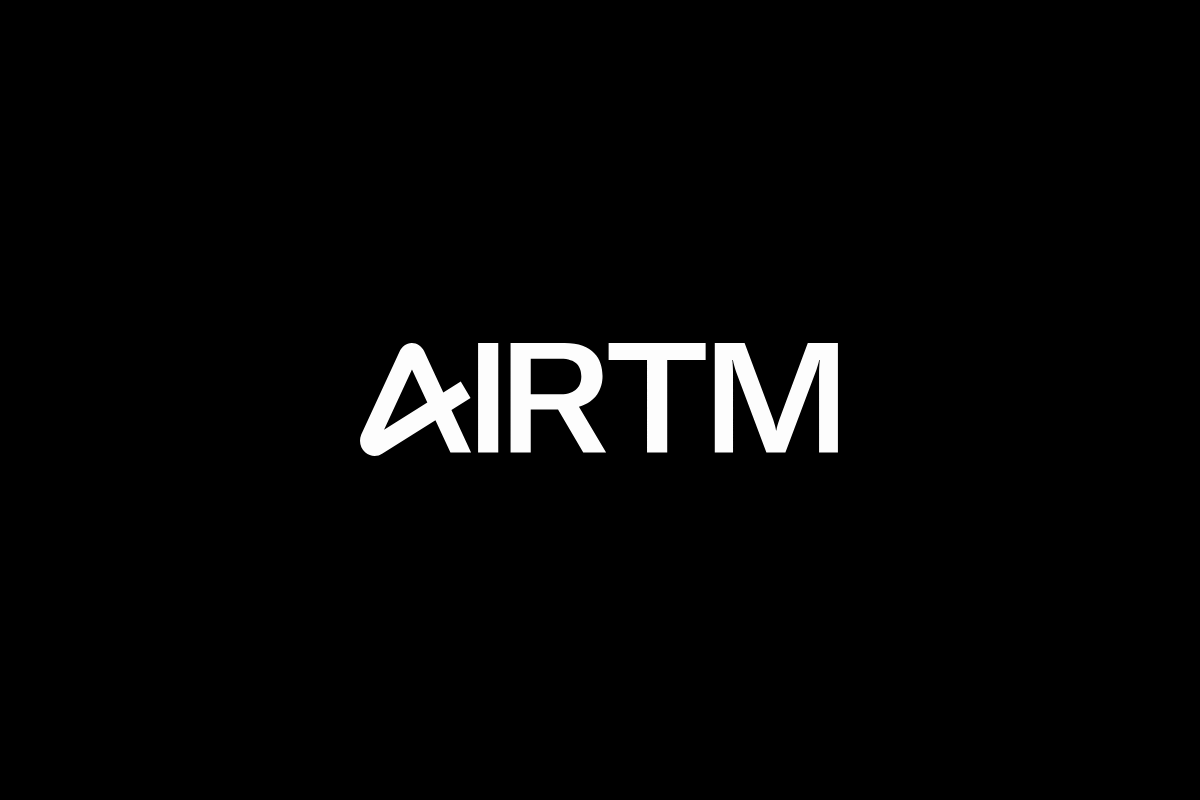Fintech
BIONIK Laboratories: Strong Sales Pipeline Delivering Hope to Stroke Survivors

As BIONIK Laboratories (BNKL) marks National Stroke Awareness Month, Interim CEO, Richard Russo, talks about what’s next for the company
New York, New York–(Newsfile Corp. – May 25, 2022) – PCG Digital – Stroke is an enormous public health issue that can strike anyone at any time, regardless of age or health status. Worldwide, stroke is the second leading cause of death and a leading cause of serious long-term disability. According to the American Heart Association, each year stroke affects 800,000 individuals. More than two thirds of stroke survivors receive rehabilitation services after hospitalization.
Recovering from stroke can be a lengthy process, often requiring a significant number of hours in rehabilitation therapy. InMotion robotics sets out to deliver high repetitions, the right intensity and the proper dosage that traditional therapy can’t provide.
BIONIK Laboratories (OTCQB: BNKL) is a medical robotics company providing rehabilitation and assistive technology solutions to individuals with neurological and mobility challenges and, most notably, is playing an important role in individuals’ physical rehabilitation when recovering from stroke.
May is National Stroke Awareness Month and today we’re speaking to BIONIK Laboratories Interim CEO, Rich Russo, to find out more about how BIONIK’s devices are helping stroke survivors as they rebuild their lives.
Q: National Stroke Awareness Month highlights the serious impact stroke can have on individuals and their lives as they work through their recovery. Can you talk a little about BIONIK’s mission?
A: Stroke is a devastating reality for many Americans and their families. It can affect anyone at any age and the purpose of National Stroke Awareness Month is to increase public education, so people know the signs to watch for, and how to act when they suspect someone is having a stroke.
BIONIK’s goal is to enable the millions with movement impairments to lead fuller and more independent lives by fostering hope, recovery, and independence across the rehabilitation continuum of care. Our quality-of-life solutions include the use of InMotion robotic therapy by physical, occupational and speech therapists, in both inpatient and outpatient rehabilitation care settings. Ours is one of the only devices that can be used for upper extremity rehabilitation for a variety of treatment approaches in multiple care settings.
Q: How do BIONIK’s devices help patients?
A: Our InMotion therapy sessions guide patients through specific tasks aiming to improve motor control of the affected limb by increasing coordination, range of motion and strength. InMotion therapy fosters hope by showing patients their objective progress and facilitates recovery by enabling physical and occupational therapists to achieve high repetitions with their patients during therapy.
Q: How do BIONIK’s devices potentially speed up patient recovery time?
Repetition of key motions is vital for stroke survivors who are working to regain motor function, strength, and coordination. Consistent repetition helps reestablish communication between the damaged parts of the brain and the body, increasing neuroplasticity and facilitating recovery. In a conventional therapy session, a therapist and patient can achieve 30-60 repetitions of an exercise. InMotion devices enable patients to complete 500-1,000 clinician-guided repetitions of key motions in a 30-60-minute session.
Hope also plays a big part in the recovery journey. We have seen our InMotion devices inspire hope in patients. Therapists regularly tell us that InMotion Eval, the devices’ evaluation and reporting system, motivates patients by allowing them to see their progress, both graphically and by the numbers.
Q: What message does BIONIK want to send to stroke survivors?
A: Each day we are driven by our mission, which is to help people lead fuller and more independent lives. If you or a loved one has had a stroke that’s adversely affected the ability to move your arm, and you’ve never received robotic therapy, there is still hope. Robotic therapy has been shown to be effective years, even decades after a stroke. The longest documented time span between stroke and robotic therapy with a recorded reduction in impairment is 23 years!
Recognition of robotic therapy for stroke for neurological rehabilitation is also increasing. The American Heart Association just this month updated their Guidelines for Stroke Care and Recovery Guidelines to highlight the use of robotic therapy for upper-extremity mobility impairments.
Q: And finally, what are the top three messages you would like investors to hear?
The first is our focus on sales: We are excited that our sales pipeline is the strongest it has been in BIONIK’s history.
The second is our relationships: We now have more than 450 InMotion units in place in over 20 countries and continue to build strong relationships with hospital groups and in-patient facilities.
The third is product development: We are now focused on enhancing our existing products and new product development through the use of artificial intelligence and machine learning as well as expanding our distribution channels in the U.S. and internationally.
And looking to the future, we are always exploring other strategic avenues that could showcase BIONIK’s advanced robotics and technology that improves the quality of life for stroke victims.
Disclaimer
This communication was produced by PCG Digital Holdings, LLC, an affiliate of PCG Advisory Inc., (together “PCG”). PCG is not a registered or licensed broker-dealer nor investment adviser. No information contained in this communication constitutes an offer to sell, a solicitation of an offer to buy, or a recommendation of any security. PCG may be compensated by respective clients for publicizing information relating to its client’s securities. See www.pcgadvisory.com/disclosures.
PCG Digital
[email protected]
646-863-6341
Fintech
Fintech Pulse: Your Daily Industry Brief (Chime, ZBD, MiCA)

As we close out 2024, the fintech industry continues to deliver headlines that underscore its dynamism and innovation. From IPO aspirations to groundbreaking regulatory milestones, today’s updates highlight the transformative power of fintech partnerships, regulatory evolution, and disruptive technologies. Here’s what you need to know.
Chime’s Quiet Step Toward Public Markets
Chime, the U.S.-based financial technology startup best known for its digital banking services, has taken a significant step by filing confidential paperwork for an initial public offering (IPO). As one of the most valuable private fintechs in the U.S., Chime’s move could potentially signal a renewed appetite for fintech IPOs in a market that has been cautious following fluctuating valuations across the tech sector.
With a valuation that reportedly exceeded $25 billion in its last funding round, Chime’s IPO could set a new benchmark for the industry. Observers note that its strong customer base and revenue growth may make it an appealing choice for investors seeking to capitalize on the digital banking boom. However, the timing and success of the IPO will depend on broader market conditions and the regulatory landscape.
Source: Bloomberg
ZBD’s Pioneering Achievement: EU MiCA License Approval
ZBD, a fintech company specializing in Bitcoin Lightning network solutions, has made history by becoming the first to secure an EU MiCA (Markets in Crypto-Assets Regulation) license. This landmark approval by the Dutch regulator positions ZBD at the forefront of compliant crypto-fintech operations in Europe.
MiCA, which aims to harmonize the regulatory framework for crypto-assets across the EU, has been a focal point for industry players aiming to establish legitimacy and expand their offerings. ZBD’s achievement not only validates its operational rigor but also sets a precedent for other fintech firms navigating the evolving regulatory landscape.
Industry insiders view this as a strategic advantage for ZBD as it broadens its footprint in Europe. By leveraging its regulatory approval, the company can accelerate its product deployment and establish trust with institutional and retail users alike.
Source: Coindesk, PR Newswire
The Fintech-Credit Union Synergy: A Blueprint for Innovation
The convergence of fintechs and credit unions continues to reshape the financial services ecosystem. Collaborative initiatives, such as the one highlighted in the recent partnership between fintech innovators and credit unions, are proving to be a potent force in delivering tailored financial solutions.
This “dream team” approach allows credit unions to leverage fintech’s technological expertise while maintaining their community-focused ethos. Key areas of collaboration include digital payments, personalized financial management tools, and enhanced loan processing capabilities. These partnerships not only enhance member engagement but also enable credit unions to remain competitive in an increasingly digital-first financial environment.
Industry analysts emphasize that such collaborations underscore a broader trend of traditional financial institutions embracing fintech-driven solutions to bridge service gaps and foster innovation.
Source: PYMNTS
Tackling Student Loan Debt: A Fintech’s Mission
Student loan debt remains a pressing issue for millions of Americans, and a Rochester-based fintech aims to offer relief through its cloud-based platform. This innovative solution is designed to simplify loan management and provide borrowers with actionable insights to reduce their debt burden.
The platform’s features include repayment optimization tools, personalized financial education, and seamless integration with loan servicers. By addressing the complexities of student loan management, this fintech is empowering borrowers to make informed decisions and achieve financial stability.
As the student loan crisis continues to evolve, solutions like this highlight the critical role fintech can play in addressing systemic financial challenges while fostering financial literacy and inclusion.
Source: RBJ
Industry Implications and Takeaways
Today’s updates underscore several key themes shaping the fintech landscape:
- Regulatory Milestones: ZBD’s MiCA license approval exemplifies the importance of regulatory compliance in unlocking growth opportunities.
- Strategic Partnerships: The collaboration between fintechs and credit unions demonstrates the value of combining technological innovation with traditional financial models to drive customer-centric solutions.
- Market Opportunities: Chime’s IPO move reflects a potential revival in fintech public offerings, signaling confidence in the sector’s long-term prospects.
- Social Impact: Fintech’s ability to tackle systemic issues, such as student loan debt, showcases its role as a force for positive change.
The post Fintech Pulse: Your Daily Industry Brief (Chime, ZBD, MiCA) appeared first on News, Events, Advertising Options.
Fintech
SPAYZ.io prepares for iFX EXPO Dubai 2025

Leading global payments platform SPAYZ.io has confirmed it will be attending iFX EXPO Dubai 2025 on 14 to 16 January. Exhibiting at Stand 64 at Trade Centre Dubai, SPAYZ.io’s team of professionals will be on hand providing live demonstrations of its renowned payment services for payment providers. Attendees will also receive exclusive insight into SPAYZ.io’s plans for 2025 alongside early early access to its upcoming plans for the new year.
SPAYZ.io delivers a host of payment solutions that leverage the latest technological innovations and open access to the fastest growing emerging markets across Africa, Europe and Asia. Over the past year, there has been huge demand for its Open Banking and local payment method services, alongside bank transfers, mass payouts, online banking and e-wallets.
Yana Thakurta, Head of Business Development at SPAYZ.io commented: “We look forward to once again participating at iFX Dubai to expand our network of partners and clients. It’s a fantastic way to kick off the year, connecting with thousands of industry leaders from FOREX platforms to trading companies, and everything in between.
“Our key goal for iFX Dubai EXPO 2025 is to expand our portfolio of solutions and geographies. We’re using this as an opportunity to partner with like-minded entities who share our ambition to provide payment solutions that are truly global.”
Come meet SPAYZ.io’s team at the Trade Centre Dubai at Stand 64. You can also book a meeting slot with a member of a team.
The post SPAYZ.io prepares for iFX EXPO Dubai 2025 appeared first on News, Events, Advertising Options.
Fintech
Airtm Enhances Its Board of Directors with Two Strategic Appointments

Airtm, the most connected digital dollar account in the world, is proud to announce the addition of two distinguished industry leaders to its Board of Directors: Rafael de la Vega, Global SVP of Partnerships at Auctane, and Shivani Siroya, CEO & Founder of Tala. These appointments reflect Airtm’s commitment to innovation and financial inclusion as the company enters its next phase of growth.
“We are thrilled to welcome Rafael and Shivani to Airtm’s Board of Directors,” said Ruben Galindo Steckel, Co-founder and CEO of Airtm. “Their unique perspectives and proven track records will be invaluable as we continue scaling our platform to empower individuals and businesses in emerging markets. Together, we’ll push the boundaries of financial inclusion and innovation to create a more connected and equitable global economy. Rafael and Shivani bring a wealth of experience and strategic insight that will strengthen Airtm’s mission to connect emerging economies with the global market.”
Rafael de la Vega, a seasoned leader in fintech global partnerships and technology innovation, is currently the Global SVP of Partnerships at Auctane. With a proven track record of delivering scalable, impactful solutions at the intersection of fintech, innovation, and commerce, Rafael’s expertise will be pivotal as Airtm continues to grow. “Airtm has built a platform that breaks down barriers and opens up opportunities for people in emerging economies to connect to global markets. I am excited to contribute to its growth and help further its mission of fostering financial inclusion on a global scale,” said Rafael.
Shivani Siroya, CEO and Founder of Tala, is a pioneer in financial technology, renowned for empowering underserved communities through access to credit and essential financial tools. Her leadership in leveraging data-driven innovation aligns seamlessly with Airtm’s vision of creating more equitable financial opportunities. “Empowering underserved communities has always been at the core of my work, and Airtm’s mission resonates deeply with me. I’m thrilled to join the Board and work alongside such a dynamic team to expand access to financial tools that truly make a difference in people’s lives,” said Shivani.
The post Airtm Enhances Its Board of Directors with Two Strategic Appointments appeared first on News, Events, Advertising Options.
-

 Fintech PR6 days ago
Fintech PR6 days agoGCL Energy Technology and Ant Digital Technologies Launch First Blockchain-Based RWA Project in Photovoltaic Industry
-

 Fintech PR5 days ago
Fintech PR5 days agoBybit Champions Web3 Innovation and Strengthens Ties with Asia’s Crypto Community at Taipei Blockchain Week
-

 Fintech PR5 days ago
Fintech PR5 days ago2025 Will See Increased QR Code Payments but Payment Card IC ASPs Will Not Return to Pre-Covid Levels
-

 Fintech PR6 days ago
Fintech PR6 days agoH.I.G. Realty Announces Strategic Partnership with Queen Mary BioEnterprises Innovation Centre in London
-

 Fintech PR6 days ago
Fintech PR6 days agoCKGSB Successfully Hosts 2024 MBA Professor Training Program for Western China
-

 Fintech PR3 days ago
Fintech PR3 days agoMarkets Show Resilience Ahead of End-of-Year Options Expirations: Bybit x Block Scholes Crypto Derivatives Report
-

 Fintech PR3 days ago
Fintech PR3 days agoSinopec Completes Construction of China’s Largest Petrochemical Industrial Base
-

 Fintech PR3 days ago
Fintech PR3 days ago2024 Global Youth Design Contest on Chinese Characters Themed “Guiyang in Characters” Successfully Concluded
















